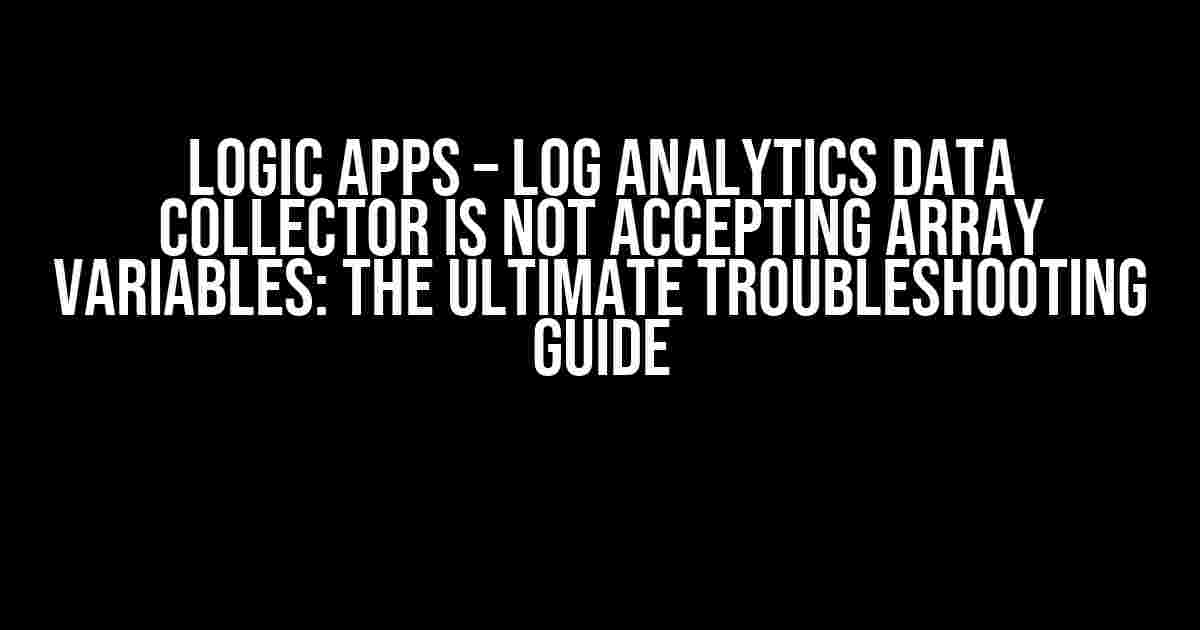Are you pulling your hair out because your Logic Apps Log Analytics Data Collector is refusing to accept array variables? Well, you’re not alone! This pesky issue has been the bane of many developers’ existence, but fear not, dear reader, for we’re about to embark on a thrilling adventure to conquer this problem once and for all!
The Problem: A Brief Overview
When working with Logic Apps and Log Analytics, you might encounter an issue where the Log Analytics Data Collector is not accepting array variables. This can be frustrating, especially if you’re trying to collect and analyze data from multiple sources or systems. The error message might look something like this:
"Error: The request body contains one or more invalid property values"
But Why?! The Mystery Behind the Error
The reason behind this error lies in the way Log Analytics Data Collector handles array variables. By default, it’s not designed to accept array variables, which can lead to this error. But don’t worry, we’ve got some clever workarounds to share with you!
Solution 1: Convert the Array to a String
One approach is to convert the array variable into a string using the `join` function. This method is straightforward and easy to implement. Here’s an example:
{
"variables": {
"myArray": ["apple", "banana", "orange"]
},
"actions": {
"Convert_Array_To_String": {
"type": "SetVariable",
"name": "myString",
"value": "@join(', ', variables('myArray'))"
}
}
}
In this example, we’re using the `join` function to convert the `myArray` variable into a string, separated by commas. The resulting string can then be sent to the Log Analytics Data Collector.
Pros and Cons
This method is easy to implement, but it has some limitations. For instance, if you’re dealing with large arrays or complex data structures, this approach might not be efficient. Additionally, if you need to maintain the original array structure, this method might not be suitable.
Solution 2: Use the `Json` Function
Another approach is to use the `json` function to convert the array variable into a JSON string. This method is more flexible than the previous one and allows you to maintain the original array structure.
{
"variables": {
"myArray": ["apple", "banana", "orange"]
},
"actions": {
"Convert_Array_To_JSON": {
"type": "SetVariable",
"name": "myJSON",
"value": "@json(variables('myArray'))"
}
}
}
In this example, we’re using the `json` function to convert the `myArray` variable into a JSON string. The resulting JSON string can then be sent to the Log Analytics Data Collector.
Pros and Cons
This method is more flexible than the previous one, but it requires a good understanding of JSON data structures. Additionally, if you’re dealing with very large arrays or complex data structures, this approach might not be efficient.
Solution 3: Use the `Array` Function
A third approach is to use the `array` function to convert the array variable into a format that’s acceptable by the Log Analytics Data Collector. This method is more efficient than the previous two and allows you to maintain the original array structure.
{
"variables": {
"myArray": ["apple", "banana", "orange"]
},
"actions": {
"Convert_Array_To_Array": {
"type": "SetVariable",
"name": "myArrayFormatted",
"value": "@array(variables('myArray'))"
}
}
}
In this example, we’re using the `array` function to convert the `myArray` variable into a format that’s acceptable by the Log Analytics Data Collector. The resulting array can then be sent to the Log Analytics Data Collector.
Pros and Cons
This method is more efficient than the previous two and allows you to maintain the original array structure. However, it requires a good understanding of the `array` function and its limitations.
Troubleshooting Tips and Tricks
Here are some additional tips and tricks to help you troubleshoot the issue:
- Check the data type of your array variable: Make sure it’s an array and not a string or object.
- Verify the JSON structure: Ensure that your JSON structure is correct and doesn’t contain any invalid property values.
- Use the `outputs` function: Use the `outputs` function to inspect the output of your Logic App and identify any issues.
- Test with a sample array: Test your Logic App with a sample array to isolate the issue.
- Check the Log Analytics Data Collector settings: Ensure that the Log Analytics Data Collector settings are configured correctly.
Conclusion
In conclusion, the Log Analytics Data Collector not accepting array variables is a common issue that can be resolved using one of the three solutions outlined above. By converting the array to a string, using the `json` function, or using the `array` function, you can successfully collect and analyze data from multiple sources or systems.
Remember to troubleshoot the issue using the tips and tricks outlined above and to test your Logic App thoroughly to ensure that it’s working as expected.
Happy coding, and may the Logic Apps be ever in your favor!
| Solution | Description | Pros | Cons |
|---|---|---|---|
| Convert Array to String | Use the `join` function to convert the array to a string. | Easy to implement, straightforward | Not suitable for large arrays, loses original array structure |
| Use the `Json` Function | Use the `json` function to convert the array to a JSON string. | Flexible, maintains original array structure | Requires good understanding of JSON, not efficient for very large arrays |
| Use the `Array` Function | Use the `array` function to convert the array to a format acceptable by the Log Analytics Data Collector. | Efficient, maintains original array structure | Requires good understanding of the `array` function, limitations apply |
Frequently Asked Question
Get the inside scoop on resolving the pesky issue of Logic Apps – Log Analytics Data Collector not accepting array variables!
Q1: Why is Log Analytics Data Collector not accepting array variables in Logic Apps?
This issue arises because the Log Analytics Data Collector expects a JSON object as input, but array variables are not compatible with this format. You’ll need to convert the array into a JSON object or use a different approach to resolve this incompatibility.
Q2: How can I convert an array variable into a JSON object in Logic Apps?
You can use the `json()` function in Logic Apps to convert an array into a JSON object. For example, if you have an array variable `myArray`, you can use the expression `json(myArray)` to convert it into a JSON object.
Q3: Can I use a loop to iterate through the array and send each item to Log Analytics individually?
Yes, you can! Using a `foreach` loop in Logic Apps, you can iterate through the array and send each item to Log Analytics individually. This approach can be more cumbersome, but it’s a viable solution if you can’t convert the array to a JSON object.
Q4: Are there any performance implications of using a loop to send individual items to Log Analytics?
Yes, using a loop to send individual items to Log Analytics can have performance implications, especially if you’re dealing with large arrays. This approach can result in multiple requests to Log Analytics, which can increase latency and affect overall performance.
Q5: Is there a better way to handle array variables in Logic Apps when working with Log Analytics?
Yes, consider using a more robust logging mechanism, such as using Azure Monitor or Application Insights, which can handle array variables more elegantly. Alternatively, you can explore using custom logging solutions or third-party connectors that can better accommodate array variables.


